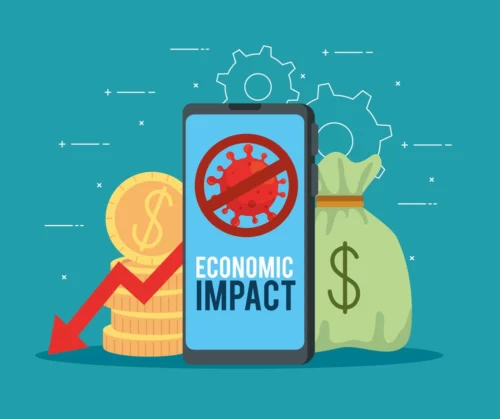The entertainment industry is one of the most dynamic sectors globally, influencing not only culture but also playing a significant role in shaping economies.
From movies and television to music and video games, the industry generates billions of dollars each year, contributing to job creation, economic growth, and social changes.
In this article, we will explore how the entertainment industry impacts the economy, from direct financial contributions to indirect effects on tourism, technology, and consumer trends.
How Does the Entertainment Industry Affect the Economy?
The entertainment industry is a major economic force. It includes film, television, music, video games, and live events, each contributing significantly to the global economy.

Direct Economic Impact
One of the most significant ways the entertainment industry impacts the economy is through its direct financial contributions. According to recent statistics, the global entertainment market is worth over $2 trillion.
The film and television industries alone generate billions annually through ticket sales, advertising, and licensing deals.
For example, the global box office revenue in 2019 surpassed $42 billion, while streaming platforms like Netflix and Disney+ have become multi-billion-dollar businesses in their own right.
Music, too, brings in substantial revenue, with the global music industry generating over $50 billion annually, driven by sales, live performances, and streaming services.
These figures demonstrate how the entertainment sector fuels economic activity, providing significant income for companies and governments alike.
Employment Opportunities
The entertainment industry also creates millions of jobs worldwide. From actors, musicians, and producers to technicians, writers, and support staff, the number of people employed in entertainment-related fields is vast. For instance, the U.S. film and television industry alone provides jobs for over 2 million people, spanning various roles from production to marketing.
In addition to direct employment, the entertainment industry creates jobs in related sectors. For example, film production often requires services from catering companies, construction firms, and transportation businesses.
Major live events, like concerts and festivals, boost local employment by providing temporary jobs in hospitality, security, and event management.
The tourism industry also benefits, as events such as film premieres and music tours attract visitors from around the world.
Indirect Economic Impact
While the direct financial contributions of the entertainment industry are significant, the indirect economic impact is equally important.
The industry influences many other sectors, driving growth and creating additional revenue streams.
Tourism and Travel
One of the most notable indirect impacts of the entertainment industry is its role in boosting tourism. Major events like film festivals, music tours, and sports competitions bring thousands of tourists to local areas, resulting in significant economic benefits.
For example, the Cannes Film Festival generates millions of euros for the French economy each year, while the Olympic Games and World Cup can lead to billions in revenue for the host country.
In addition to events, popular film and television locations often become tourist attractions. Places like New Zealand, known for its role in “The Lord of the Rings” films, or the beaches of Hawaii, famous from shows like “Hawaii Five-0,” draw thousands of fans every year.
These tourists spend money on accommodation, food, and local attractions, benefiting a range of businesses and providing a considerable boost to local economies.
Media and Advertising
The entertainment industry also plays a significant role in advertising and media. Many companies rely on entertainment content to promote their products and services through ads or product placements in movies and television shows.
These marketing strategies often lead to increased sales and market visibility. For instance, the placement of Coca-Cola products in movies like “E.T.” helped the company reach new customers, boosting its sales.
Furthermore, the media and advertising sectors benefit from entertainment content by creating new opportunities for brand exposure.
Television networks and digital platforms provide advertising space during popular shows, with some programs generating millions of dollars in ad revenue. Entertainment, in this context, becomes a powerful tool for driving economic activity in other industries.
Technology and Innovation
The entertainment industry has also been a driving force in technological innovation. The development and use of new technologies, such as virtual reality (VR), augmented reality (AR), and streaming services, have been largely influenced by entertainment needs.
Companies like Netflix and Spotify have transformed how people consume media, providing on-demand content across multiple devices.
This transformation has created new economic opportunities in the technology sector, driving the growth of broadband infrastructure, mobile networks, and cloud computing.
The gaming industry, for instance, has driven advancements in gaming consoles and virtual reality technologies.
As games become more immersive, developers are pushing the boundaries of technology, benefiting industries related to hardware manufacturing, software development, and online platforms.
Cultural and Social Influence on the Economy
The entertainment industry is not only an economic powerhouse but also a force that shapes cultures and consumer behavior.
Its impact extends beyond financial gains to influence social trends, creating new markets and influencing how people spend their money.
Creation of New Markets
The entertainment sector has created entirely new markets, many of which continue to grow at a rapid pace. Esports, for example, has become a billion-dollar industry, with millions of fans tuning in to watch competitive video game tournaments.
This has led to the growth of related industries, including gaming hardware and merchandise. Similarly, mobile gaming has exploded in popularity, creating a new revenue stream for developers and tech companies.
The rise of social media platforms like YouTube, TikTok, and Instagram has also had a profound impact. These platforms have given rise to new forms of entertainment, where user-generated content becomes a driver of consumer trends.
Influencers, content creators, and brands are all benefiting from this shift in the entertainment landscape, further fueling economic growth.
Soft Power and International Relations
Another way the entertainment industry impacts the economy is through soft power, which refers to the ability of a country to influence others through cultural appeal rather than economic or military means.
The global popularity of Hollywood films, K-pop music, and British television shows is an example of how entertainment can extend a country’s cultural reach, enhancing its global image and strengthening its economic ties with other nations.
Exports of entertainment products—such as films, TV shows, and music—are a key element of this cultural diplomacy. For example, the global success of American films has generated billions of dollars in international sales and distribution rights.
Similarly, the worldwide popularity of South Korean pop music (K-pop) has opened new markets for South Korean businesses and bolstered its economy.
Shaping Consumer Trends
Entertainment content also has the power to shape consumer trends. Movies, television shows, and music influence how people spend their money on products and services.
For example, fashion trends often emerge from popular TV shows and films, prompting consumers to purchase clothing and accessories inspired by their favorite characters. Products featured in movies or music videos, such as cars or tech gadgets, often see a rise in sales due to the exposure they receive in entertainment media.
Challenges and Economic Risks
Despite the vast economic benefits, the entertainment industry faces several challenges that can impact its financial stability.
Market Saturation
One significant issue is market saturation. With an overwhelming amount of content available through streaming services, social media platforms, and video games, the competition for consumer attention has never been fiercer.
While this benefits consumers with more choices, it can lead to declining profitability for content creators, especially those who cannot secure enough viewers or subscribers.
Economic Vulnerabilities
The entertainment industry is also vulnerable to economic downturns. During recessions, people tend to cut back on discretionary spending, which includes entertainment.
Movie theaters, concert venues, and other entertainment-related businesses may suffer when consumers reduce their spending.
Moreover, the global nature of the industry means that events such as the COVID-19 pandemic can have a widespread economic impact, affecting everything from film productions to live performances.
Impact of Global Crises
The COVID-19 pandemic illustrated how external crises can disrupt the entertainment industry. Movie theaters around the world closed, film productions were delayed, and live concerts were canceled.
However, the pandemic also accelerated the shift to digital entertainment, with streaming platforms and virtual events booming as a result.
As the industry recovers, it will need to adapt to these new realities and explore innovative ways to continue contributing to the economy.
The Future of the Entertainment Industry and Its Economic Impact
Looking ahead, the entertainment industry is poised to continue evolving, with digital platforms, new technologies, and changing consumer behaviors shaping its future.

Digital Transformation
Streaming platforms are expected to remain a dominant force in the industry, continuing to reshape how people consume media.
As technology advances, new forms of entertainment, such as virtual reality and interactive content, will likely become more mainstream.
These innovations will not only provide fresh entertainment experiences but also create new economic opportunities in tech and digital sectors.
Shifts in Consumer Behavior
As consumers increasingly turn to on-demand services, traditional business models in film and television may continue to decline.
However, this shift will also create new revenue streams for content creators and tech companies.
Social media platforms, which have become major players in the entertainment industry, will likely continue to grow in influence, further transforming how entertainment is produced, distributed, and consumed.
Sustainability and the Green Economy
Sustainability is becoming an important focus in the entertainment industry. Many companies are now adopting greener practices in film production, music tours, and event management.
The move toward sustainability could also provide economic benefits, such as cost savings and the creation of new eco-friendly business opportunities.
Conclusion
The entertainment industry is much more than a source of cultural value—it is an essential pillar of the global economy. From direct revenue generation to creating jobs and driving innovation, the entertainment sector’s economic impact is far-reaching.
Despite facing challenges such as market saturation and economic downturns, the industry’s adaptability ensures its continued relevance and growth in the future.
As entertainment continues to evolve, its influence on the economy will only become more pronounced, shaping industries and consumer behaviors for years to come.


 Tags:
Tags:










